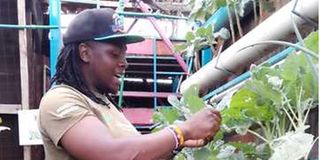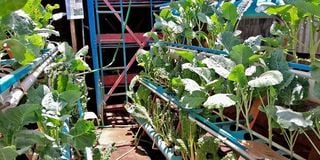A group of youths from Kahawa West in the outskirts of Nairobi have transformed a bar into a thriving kitchen garden using the modern farming technology known as Vertical indoor farming.
The youths, consisting of 22 members, and whose enterprise is known as Cute Garden, started the venture in 2022, having realised the impact the farm had in curbing unsafe food that is mostly consumed by Nairobi residents.
According to 2022 statistics from HeinRich Roll Stiftung, 44.4 percent of vegetables consumed by Nairobi residents are unsafe.
The technology used by Cute Garden uses Ultraviolet Light to produce vegetables, which they then sell to residents.
Gabriel Mauna, 34, the founder of the group, says that among the members are youths previously involved in theft and abuse of alcohol. They are now transformed, he says.
“Engaging them has enabled us to improve the environment and curb incidents of insecurity ,” says Mauna.

Gabriel Mauna, 34, is the founder of Cute Garden.
Photo credit: Fridah Okachi | Nation Media Group
The piece of land on which the farm sits initially housed a bar. The farm utilises a circular economy model such as reusing of plastics to grow onions, kales, spinach and tomatoes, maximising the available space. The piping is arranged in layers, some pipes connected with UVA bulbs which light up at night to nourish the plants.
“The lower parts of the plants are affected by the shade, we use UVA bulbs to help them get light,” explains Mauna.
Kelvin Mugai, 33, the assistant farm manager, urges Nairobi residents to maximise their small backyards to farm safe vegetables instead of relying on the ones in the market.
“Do not underestimate the small spaces you have, make good use of them, if well utilised, one can harvest vegetables equivalent to half an acre if you embrace technology and innovation,” says Mugai, adding that when they urge people to farm, they ask, “where and how?” You don’t have to have a large farm to grow food, he says.
“Vertical Garden farming for urban farming needs a space that can hold a few pipes with a length of meter. You can plant between 19 to 30 plants.”
The farm uses organic methods of pest control such as use of rabbit urine to kill pests and as manure. They also use garlic chili water to keep away pests.
“We don’t use chemicals from the store, if these plants reach a point where they need a pesticide, we use rabbit urine, which acts as manure and pesticide. We also use kitchen waste such as onion peelings and discarded parts of vegetables as well as animal manure, such as chicken droppings.”
Sufficient water is a challenge, which the youths have found a solution for – storage. They get water t twice a week from Nairobi City County.
“To solve this issue, we installed several small tanks where we collect water,” says Mugai.

Thriving sukuma wiki and spinach after using UV light at night.
Photo credit: Fridah Okachi | Nation Media Group
He explains that this type of farming is costly, especially where insecurity is rampant. Most slum areas are prone to incidences of theft. To discourage such cases, the group installed CCTV cameras to monitor the activities going on.
With the installation of the CCTV cameras, they have managed to curb theft in their farm. “Our plants are not stolen, and many of the young people who were thieves are now guards.”
They hope to expand the farm to a larger scale.
“This area is not very large, we hope to acquire a larger farm to accommodate the machines we use to drill these trenches.”
Mauna believes that by consuming safe food, the number of Kenyans seeking medical treatment due to ill health caused by consuming contaminated food will greatly reduce.
It is important, they say, to consume food whose source is known.
Source: nation.africa

Leave a Reply